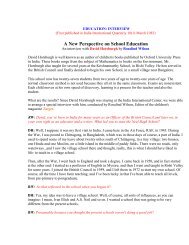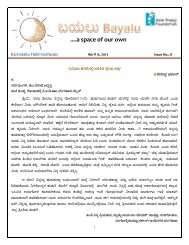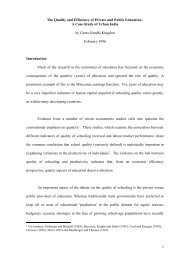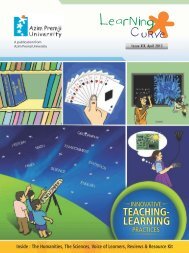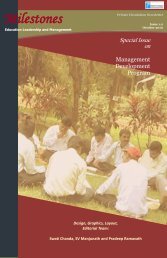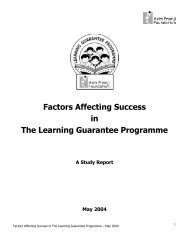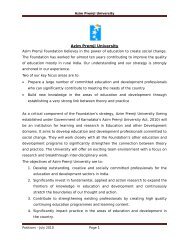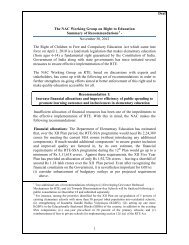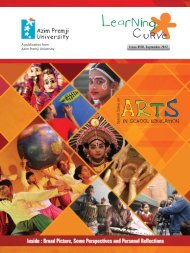Indesign Pagesnew.indd - Azim Premji Foundation
Indesign Pagesnew.indd - Azim Premji Foundation
Indesign Pagesnew.indd - Azim Premji Foundation
You also want an ePaper? Increase the reach of your titles
YUMPU automatically turns print PDFs into web optimized ePapers that Google loves.
29<br />
Section E<br />
The Lens that Social Science Conferred Upon Me<br />
Nidhi Tiwari<br />
The other day, while driving back from Shimoga I got<br />
into a bit of an argument with a close friend of mine.<br />
Traversing into philosophy, we were debating whether<br />
there is anything called ‘gray’ in life. It all began when I took<br />
serious objection to his words ‘there is nothing called gray<br />
in my life, I always live in black and white!’ He further went<br />
to the extent of saying: “I will never teach my children that<br />
there is something called gray.”<br />
I hope you are with me when I use the word ‘gray’. Here,<br />
gray on P129 refers to the various situations/relationships/<br />
attitudes/actions which are outside our normally stated<br />
fence of values. For example, while in public nobody accepts<br />
that bribery is good, it still thrives! How do you resolve<br />
this paradox? The ‘Swalpa adjust madi..’ (please adjust a<br />
bit) attitude is yet another example. Call it situational or<br />
circumstantial - the gray in us does appear every now and<br />
then – whether we admit it or not. It is a diffi cult admission<br />
to make – I agree; it takes courage.<br />
It took me by absolute surprise that there live individuals<br />
in this world who completely ignore or believe that their<br />
actions/thoughts/interactions with the world are totally<br />
bereft of any gray. Driving the next 200 kms in mental<br />
cacophony, the disbelief continued to haunt me. After many<br />
weeks, there fi nally came a ‘eureka’ moment! Could the<br />
actual discord between my friend and I have been the fact<br />
that he used a ‘science lens’ to view the world while mine<br />
was steeped in a background of social science? Don’t you<br />
feel that the sciences are far more defi nite, precise, rightwrong,<br />
demanding a certain degree of absoluteness, proof<br />
and closure? While on the other hand, the social sciences<br />
to my mind are more fl exible, accommodating, and willing<br />
to accept different points of view. I feel this stems from an<br />
innate belief that there are no absolute rights/wrongs. It has<br />
more to do with the lens you view them with.<br />
I Started Gathering Proof for My Latest<br />
Hypothesis<br />
And believe me; the more I think about it, the more convinced<br />
I am that people from a background of social science view<br />
the world with a lens that’s hopelessly inclusive and least<br />
exclusive.<br />
It is this lens that I wish to write about and how the subject<br />
impacted learning through<br />
my formative years of<br />
study.<br />
Being a keen follower of<br />
politics in the country, my<br />
earliest recollection of a<br />
horrible debate was the<br />
Babri Masjid incident. Thanks to the local riots that followed,<br />
schools were closed and I had ample time to watch those<br />
painful visuals of people on top of the mosque trying to<br />
demolish the very ground that they were standing upon.<br />
Very impressionable - but a feisty little girl that I was - my<br />
instant reaction was to take sides. I kept asking my helpless<br />
parents very diffi cult questions. Why are some people<br />
saying they are right when they are actually bringing down<br />
buildings? Why aren’t the police arresting them? Naïve, yet<br />
extremely curious and eager to make sense of the event,<br />
this chaos did not settle for a long time. It got carried on<br />
to school and my social science teacher. And she did such a<br />
tremendous job of putting things in perspective!<br />
It took me by absolute surprise that<br />
there live individuals in this world who<br />
completely ignore or believe that their<br />
actions/thoughts/interactions with the<br />
world are totally bereft of any gray.<br />
She began by drawing a circle in the center of the black<br />
board. She told me the circle represented the world. She<br />
asked me to fi ll in all the things that I felt were part of<br />
the world. Just as a little kid would, I fi lled in water, land,<br />
mountains, people, my family, my dog, and other things. I<br />
distinctly remember writing India in it. And then she drew<br />
a stick fi gure to the left of the circle and called it ‘Nidhi’.<br />
She drew another stick fi gure on the right and called it by<br />
some other name. She fi lled the world with a few other<br />
things that she felt the other person might want in them.<br />
She then showed me that I was seeing one part of the<br />
world and called it ‘my world’, while this other person was<br />
Pg No: 131



